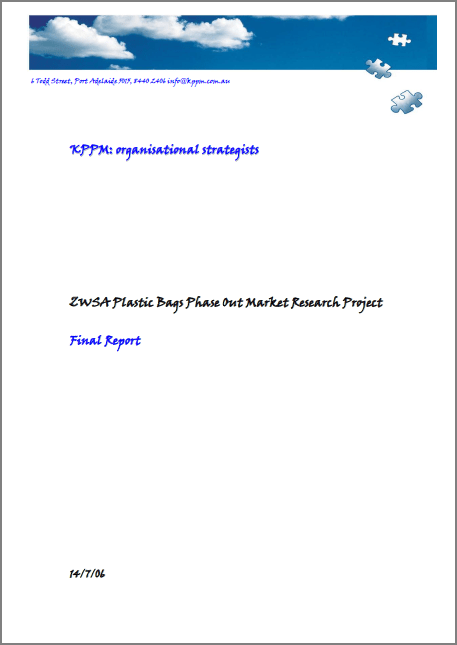
- Single-use plastics
Plastic bag phase out market research project (2006)
On 1 July, 2005 the Environment Protection and Heritage Council, a Council of all of Australia's environment ministers, agreed to a phase out of lightweight (single use) plastic shopping bags by the end of 2008. In South Australia, legislation will be introduced to ensure that the phase out occurs by that date. All shoppers and retailers are expected to have alternatives in place by December 31st 2008.
Previous 2005 research by Harrison Market Research and Planet Ark Environmental Foundation established a general level of support for reduction in use of plastic shopping bags, but identified specific demographic groups that were less likely to own reusable shopping bags or who owned reusable bags but forgot to take them when shopping.
KPPM Organisational Strategists were commissioned to undertake qualitative research that identified education and communication strategies to support the plastic bag phase out in South Australia. A total of 19 focus groups were held with 119 participants, representing city and rural, old, young, non-English speaking, traders and consumers. The key findings from this research were: There was a high level of awareness, across all groups, of why plastic bags were being phased out. Fewer people were aware of the proposed date of the phase out, but most were aware that there were plans to ban plastic bags in South Australia.
Both consumers and retailers wanted information on which bags were to be phased out, which were not, and the reasons why. Retailers will need a sufficient lead time to use existing stocks of single use plastic bags and to place orders for alternatives.
The research found that the main support required by small retailers is widespread, uniform information to the public about the impending phase out. This will ensure that the phase out is seen as a public good, rather than as changing service standards by individual retailers. Information on the timeframe for the phase out was seen as the most important information required by both consumers and retailers.
Finding alternatives to single use plastic bags for bin liners was a persistent problem and participants wanted information on environmentally safe alternatives to reusing plastic shopping bags. Opportunities for new shopping bag materials and designs were seen as a positive element of the phase out. This was a frequent topic of discussion by both consumers and retailers, with a particular focus of discussion about the opportunities to personalise reusable bags or to use a range of bags for different purposes.
This indicates a high level of acceptance of the bags and a reason why some consumers (women, young people and random shoppers) don’t currently use their reusable bags every time they shop. he discussion in focus groups predominantly focussed on practicalities. This indicates that the community is prepared for the change and has shifted from asking ‘why do we have to do it’ to ‘how will we do it’ and ‘when will it be done’.




